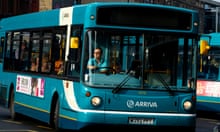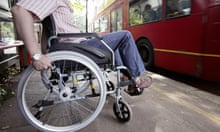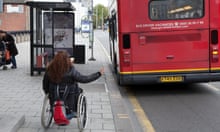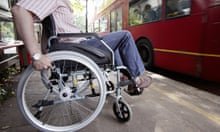Disability rights campaigners have hailed a ruling by the supreme court that bus drivers must try to persuade other passengers to make room for wheelchair users.
Drivers may stop the bus “with a view to pressurising or shaming recalcitrant non-wheelchair users to move” if they believe a refusal is unreasonable, the judgment declared.
The case, brought by a wheelchair user who was unable to board a bus in Yorkshire, highlights the need for legislative changes, the supreme court judgment suggested. A bus services bill is currently going through parliament.
Doug Paulley attempted to get on a First Group bus from Wetherby to Leeds in February 2012 but the wheelchair space was being used by a mother with a pushchair and a sleeping child.
The woman rejected the driver’s request to move or fold the pushchair and so the driver told Paulley he could not board the vehicle. As a result, he missed his train connection at Leeds and was unable to meet his parents for lunch that day.
In its ruling on Wednesday, the court allowed Paulley’s appeal to the extent that the driver should have taken further steps to pressurise the non-wheelchair user into making space.
“Where the driver concludes that non-wheelchair users’ refusal is unreasonable,” Lord Nuebeger, the president of the supreme court said, “it seems to me that it would be unjustifiable for a bus-operating company to have a policy which does not require some further step of the bus driver ...
“Where there is some other place on the bus to which a non-wheelchair user could move, I cannot see why a driver should not be expected to rephrase any polite request as a requirement.”
If that did not work and the bus was ahead of schedule, Neuberger added, the bus could be halted for a few minutes to apply pressure to the unreasonable and unmoved passenger.
Paulley took his claim for discrimination to the supreme court after the court of appeal in 2014 decided transport firms were not required to force one traveller to make way for another.
By a majority of four to three justices, however, the court decided not to award damages to Paulley.
Welcoming the decision, Paulley said: “I’m absolutely delighted. It represents a significant cultural change. It’s been a long fight of five years by a lot of people. I’m incredibly grateful that so many people put so much time, effort and passion into it. I know it was done for the cause.
“We have achieved something here that will make a difference not just for wheelchair users but for other disabled people.”
Chris Fry, of the law firm Unity Law, who represented Paulley, told disability campaigners who attended the hearing: “It’s a win for Doug and all of you, so that you will have an expectation that you have a right to travel.
“Three of the supreme court justices would have gone as far as saying that the policy should go as far as removing people from the bus who do not comply [with a request to make room].”
The judgment, Fry said, replaced the old “request and retreat” policy for drivers with a more forceful “request and require” policy.
“It’s the ‘Paulley principle’. We now have priority and right of access. We know that parliament is interested in this case. There’s a lot more to do.”
Robin Allen QC, who represented Paulley, said: “All the judges say that legislative change is needed. The bus services bill is now before parliament.
“The transport select committee have said they will have to consider their position after the Paulley judgment.
“The majority of the justices said that to have a notice that said you would be evicted [if you do not make room] would be going too far. First come first served is not reasonable.”
The transport select committee has suggested that an EU regulation that will make disability training for bus drivers compulsory should be incorporated into domestic legislation.
Giles Fearnley, managing director of First Bus, said the ruling did not require bus drivers to remove customers from vehicles. “This provides welcome clarity for bus operators, our drivers and our customers,” he said.
“This was clearly a difficult case for the supreme court with six different judgments ... we will implement any necessary changes.
“We recognise how important it is that bus services are accessible for all customers, and we lead the industry in improving bus travel for customers with all disabilities. We are therefore also pleased that the supreme court found that we did not discriminate against Mr Paulley.”
Richard Lane, head of communications at disability charity Scope, said: “This is an important milestone. It’s a victory for common sense, and disabled customers will now want to see action from travel companies.
“Wheelchair spaces on buses exist because of a sustained campaign by disabled people. But today many wheelchair users still face difficulties accessing the spaces on buses, often causing a great deal of distress.
“Most people don’t realise just how difficult it is for disabled people to get around, to get to the shops, or to visit friends. These spaces are often a lifeline into work and the local community.
“This ruling sends a clear message to transport providers right across the country that they have a responsibility to make travel easier and more comfortable for all of their customers.”
Paulley’s test case was supported by the the Equality and Human Rights Commission, which has called on bus operators to ensure that people using wheelchairs can travel more easily.
The EHRC’s chairman, David Isaac, said: “Public transport is essential for disabled people to live independently, yet bus companies have not made it easy for this to happen.
“This is a victory for disabled people’s rights. The success of this case means bus companies will have to end ‘first come, first served’ policies, increasing peace of mind for disabled people.
“For years, wheelchair users have been deterred from using vital public transport links because they could not be sure they will be able to get on. Today’s judgment will make that easier.”







Comments (…)
Sign in or create your Guardian account to join the discussion